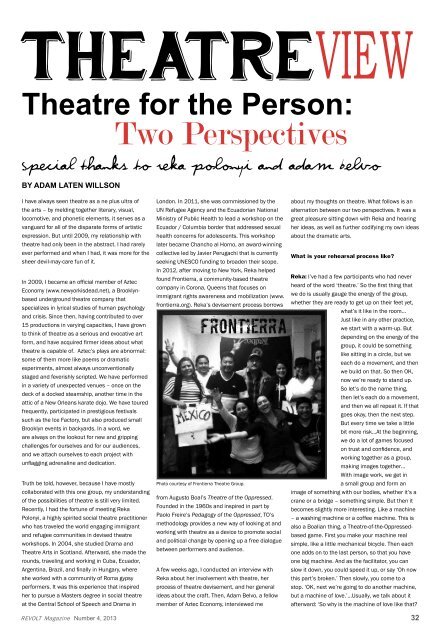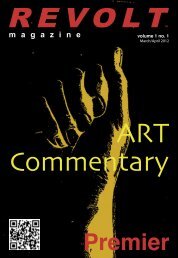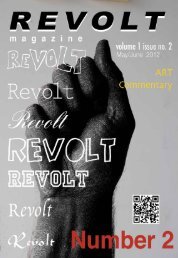Download PDF Version Revolt Magazine, Volume 1 Issue No.4
Download PDF Version Revolt Magazine, Volume 1 Issue No.4
Download PDF Version Revolt Magazine, Volume 1 Issue No.4
Create successful ePaper yourself
Turn your PDF publications into a flip-book with our unique Google optimized e-Paper software.
THEATREVIEW<br />
Theatre for the Person:<br />
BY ADAM LATEN WILLSON<br />
Two Perspectives<br />
Special Thanks to Reka Polonyi and Adam Belvo<br />
I have always seen theatre as a ne plus ultra of<br />
the arts – by melding together literary, visual,<br />
locomotive, and phonetic elements, it serves as a<br />
vanguard for all of the disparate forms of artistic<br />
expression. But until 2009, my relationship with<br />
theatre had only been in the abstract. I had rarely<br />
ever performed and when I had, it was more for the<br />
sheer devil-may-care fun of it.<br />
In 2009, I became an official member of Aztec<br />
Economy (www.newyorkisdead.net), a Brooklynbased<br />
underground theatre company that<br />
specializes in lyrical studies of human psychology<br />
and crisis. Since then, having contributed to over<br />
15 productions in varying capacities, I have grown<br />
to think of theatre as a serious and evocative art<br />
form, and have acquired firmer ideas about what<br />
theatre is capable of. Aztec’s plays are abnormal:<br />
some of them more like poems or dramatic<br />
experiments, almost always unconventionally<br />
staged and feverishly scripted. We have performed<br />
in a variety of unexpected venues – once on the<br />
deck of a docked steamship, another time in the<br />
attic of a New Orleans karate dojo. We have toured<br />
frequently, participated in prestigious festivals<br />
such as the Ice Factory, but also produced small<br />
Brooklyn events in backyards. In a word, we<br />
are always on the lookout for new and gripping<br />
challenges for ourselves and for our audiences,<br />
and we attach ourselves to each project with<br />
unflagging adrenaline and dedication.<br />
Truth be told, however, because I have mostly<br />
collaborated with this one group, my understanding<br />
of the possibilities of theatre is still very limited.<br />
Recently, I had the fortune of meeting Reka<br />
Polonyi, a highly spirited social theatre practitioner<br />
who has traveled the world engaging immigrant<br />
and refugee communities in devised theatre<br />
workshops. In 2004, she studied Drama and<br />
Theatre Arts in Scotland. Afterward, she made the<br />
rounds, traveling and working in Cuba, Ecuador,<br />
Argentina, Brazil, and finally in Hungary, where<br />
she worked with a community of Roma gypsy<br />
performers. It was this experience that inspired<br />
her to pursue a Masters degree in social theatre<br />
at the Central School of Speech and Drama in<br />
London. In 2011, she was commissioned by the<br />
UN Refugee Agency and the Ecuadorian National<br />
Ministry of Public Health to lead a workshop on the<br />
Ecuador / Columbia border that addressed sexual<br />
health concerns for adolescents. This workshop<br />
later became Chancho al Horno, an award-winning<br />
collective led by Javier Perugachi that is currently<br />
seeking UNESCO funding to broaden their scope.<br />
In 2012, after moving to New York, Reka helped<br />
found Frontierra, a community-based theatre<br />
company in Corona, Queens that focuses on<br />
immigrant rights awareness and mobilization (www.<br />
frontierra.org). Reka’s devisement process borrows<br />
Photo courtesy of Frontierra Theatre Group.<br />
from Augusto Boal’s Theatre of the Oppressed.<br />
Founded in the 1960s and inspired in part by<br />
Paolo Freire’s Pedagogy of the Oppressed, TO’s<br />
methodology provides a new way of looking at and<br />
working with theatre as a device to promote social<br />
and political change by opening up a free dialogue<br />
between performers and audience.<br />
A few weeks ago, I conducted an interview with<br />
Reka about her involvement with theatre, her<br />
process of theatre devisement, and her general<br />
ideas about the craft. Then, Adam Belvo, a fellow<br />
member of Aztec Economy, interviewed me<br />
about my thoughts on theatre. What follows is an<br />
alternation between our two perspectives. It was a<br />
great pleasure sitting down with Reka and hearing<br />
her ideas, as well as further codifying my own ideas<br />
about the dramatic arts.<br />
What is your rehearsal process like?<br />
Reka: I’ve had a few participants who had never<br />
heard of the word ‘theatre.’ So the first thing that<br />
we do is usually gauge the energy of the group,<br />
whether they are ready to get up on their feet yet,<br />
what’s it like in the room…<br />
Just like in any other practice,<br />
we start with a warm-up. But<br />
depending on the energy of the<br />
group, it could be something<br />
like sitting in a circle, but we<br />
each do a movement, and then<br />
we build on that. So then OK,<br />
now we’re ready to stand up.<br />
So let’s do the name thing,<br />
then let’s each do a movement,<br />
and then we all repeat it. If that<br />
goes okay, then the next step.<br />
But every time we take a little<br />
bit more risk…At the beginning,<br />
we do a lot of games focused<br />
on trust and confidence, and<br />
working together as a group,<br />
making images together…<br />
With image work, we get in<br />
a small group and form an<br />
image of something with our bodies, whether it’s a<br />
crane or a bridge – something simple. But then it<br />
becomes slightly more interesting. Like a machine<br />
– a washing machine or a coffee machine. This is<br />
also a Boalian thing, a Theatre-of-the-Oppressedbased<br />
game. First you make your machine real<br />
simple, like a little mechanical bicycle. Then each<br />
one adds on to the last person, so that you have<br />
one big machine. And as the facilitator, you can<br />
slow it down, you could speed it up, or say ‘Oh now<br />
this part’s broken.’ Then slowly, you come to a<br />
stop. ‘OK, next we’re going to do another machine,<br />
but a machine of love.’…Usually, we talk about it<br />
afterward: ‘So why is the machine of love like that?<br />
REVOLT<br />
<strong>Magazine</strong> Number 4, 2013 32





